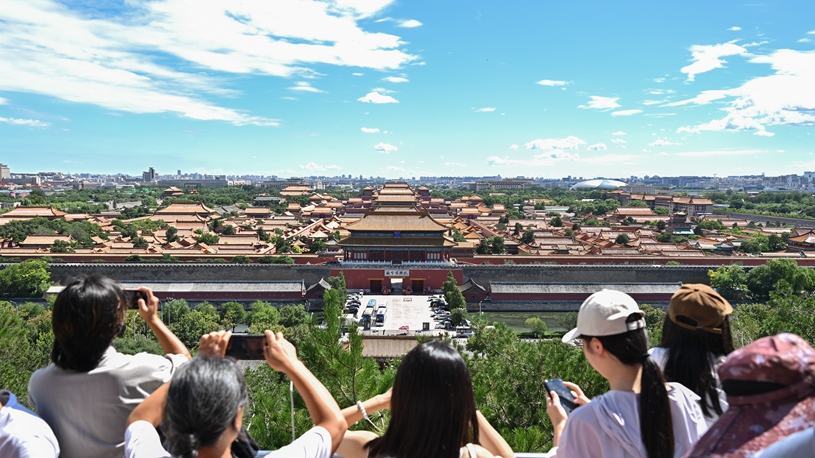"How many more must die before war ends?" -- A wail of a Palestinian mother
Source: Xinhua
Editor: huaxia
2024-08-15 22:28:16
BAGHDAD, Aug. 15 (Xinhua) -- Reem Mohammed Abu Taha sat on her hospital bed, tears welling up in her eyes as she watched the news on TV, which was filled with scenes of relentless bombings and an ever-rising death toll in Gaza.
"Over 40,000 innocent Palestinians have perished. How many more must die before this war ends?" She asked, her voice shaking.
Abu Taha is a resident of Khan Younis, a city in the southern Gaza Strip. In May, she and her three surviving children were among the first group of 27 injured Palestinians and their 42 companions to be brought to Baghdad for treatment by the Iraqi government.
Although far from homeland, their hearts remained in Gaza, where many of their loved ones are still living under constant threats.
Abu Taha's life was shattered on the early morning of Dec. 7, 2023. Without warning, Israeli airstrikes targeted the five-story building where her family lived.
"Each floor had two apartments, and each apartment housed about 10 people. We were all at home, unsuspecting, when the missiles hit," she recalled.
The Israeli missiles turned her home into rubble, claiming 24 lives in her household, including her eldest son, 19-year-old Mohammed.
"Mohammed was a brilliant child, studying engineering at al-Aqsa University. He had a bright future ahead of him, but his life was cut short in its prime," the mother said, pulling up a photo of Mohammed on the phone in her trembling hands. The smile captured in the photo has become a painful memory for her, frozen in time.
The other three children of Abu Taha were also buried under the rubble, and it took a long time to find them.
Her second son, Abdul Aziz, was rescued with multiple fractures to his jaw, skull and legs. Her daughter, Linan, suffered severe head injuries and was in a coma for nearly two months. Her youngest son, Yamen, was trapped under the rubble for about two days, suffering multiple fractures and burns. With no ambulances available, they were taken to the hospital by a donkey cart.
Eventually, Abu Taha and her three surviving children were transferred to Egypt for treatment and later to Iraq. Her husband, also severely injured, remained in Gaza.
Since the new round of conflict between Israel and Hamas erupted on Oct. 7, 2023, Israeli military actions have claimed over 40,000 Palestinian lives and injured more than 92,000.
Gaza is now in the grip of a severe humanitarian crisis, with millions displaced and necessities such as food, medicine and clean water in critical shortage. In July, UN experts warned that famine has spread throughout the Gaza Strip.
"Due to Israel's bombings and blockade, medical facilities in Gaza are extremely limited, with severe shortages of anesthetics, medicines and equipment. Many injured people have undergone amputations without anesthesia," Abu Taha said.
"Before Oct. 7 last year, life was happy and decent. Every day I would cook and wait for my children to come home from school, for my husband to return from work. We had hope. But now, everything was destroyed, our house, our mosques, our schools," she lamented.
"Gaza is now like a 'ghost city.' People are forced to keep moving, but where can they find safety? Even refugee camps, schools and hospitals haven't escaped Israel's bombings," she said, her anger mixed with despair.
"War means destruction, death, pain and separation," Abu Taha said, wiping away tears with a tissue handed to her by her daughter. "It took my dearest son, and shattered my family. Tens of thousands of Palestinians have vanished from this planet forever."
More than 10 months have passed since the onset of the conflict, and there has been no peace in sight yet. To Abu Taha, the United States bears responsibility. "The United States supplies Israel with endless weapons, but they end up killing innocent Palestinians," she said.
Still, Abu Taha held onto the hope that one day she could return to Gaza. "My biggest wish is for this war to end, and end completely. When it does, we will go back to Gaza to rebuild our homes and start anew," she said. ■











Comments